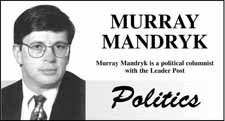One might think that the Saskatchewan Party government would be pretty much immune from most criticism of its handling of key issues in rural life.
While the former NDP government supposedly held an advantage in the so-called "softer service delivery areas" of health and education, the prosperity during this term and the Saskatchewan Party's eagerness to spend has been a huge advantage. It has allowed this government to build new hospitals and nursing homes, invest $400 million in the renovation or building of 600 Saskatchewan schools and even cut the education taxes on agricultural land.
And most feel the Sask. Party has a better handle on agriculture issues and natural resource development so critical to the rural economy right now. Moreover, the Sask. Party government's supposed better working relationship with the Conservative government in Ottawa should afford the Saskatchewan government better and quicker access to drought and flood relief program.
Finally, with its aforementioned propensity to spend money on highways - pledging to spend $1.8 billion on our roads this term, including $380 million in the current budget year - one might think that we wouldn't be hearing much about the shape of our roads, either.
Nearly $2 billion should be enough, shouldn't it? After all, this was the party that railed in opposition about how highways would be a priority for its government after years of NDP neglect. There would be no stories about local residents taking to the roads, themselves, to fix up their potholes under a Saskatchewan Party government.
Well, we may not be back to where we were in the 1990s when highway maintenance became one of the many casualties of the near-crippling debt left behind by the former Progressive Conservative administration. However, many who travel Saskatchewan roads will tell you it's not quite as rosy as they envisioned it would be under a Sask. Party government.
Consider a recent complain from NDP tourism critic Danielle Chartier that Hwy. 2 running north from the U.S. border is so filled with potholes that some American and Canadian tourism are vowing not to take this road connecting them to Waskesiu and Prince Albert National Park.
"Saskatchewan has wonderful tourism destinations but we can't expect people to travel to them and put themselves at risk with such dangerous road conditions," Chartier said in a press release.
Dangerous road conditions? Putting themselves at risk? Perhaps it's a little over-exuberant poetic license from the Opposition MLA. But anyone who has traveled Hwy. 2 of late will tell you that it's in bad shape. And what's most noticeable is surface breaks are appearing on recent patches, indicating that the government's fix of the road hasn't exactly been thorough.
How could this be? It wasn't so long ago that Hwy. 2 was a pretty good road. This can't be one of those situations where the Sask. Party government is dealing with years of neglect of a less-used highway.
More likely, the Sask. Party government is running into the simple, cold, ugly reality of just how tough it is to delivery of services in a huge province susceptible to long cold winters and wet springs.
The simply reality is that particularly wet conditions have created extraordinary challenges for the highways department that no amount of spending will quickly address. Choices have to be made as to what gets fixed first and how and alternate routes to Prince Albert and north like the No. 2 Highway are obviously less of a priority than it once was.
Of course, that's cold comfort to many local communities that do have no choice but to drive it.
They, too, are also wondering why the current government that promised so much and that has already spent so much would be struggling with the same issues that plagued the past NDP administration.
Murray Mandryk has been covering provincial politics for over 15 years.




